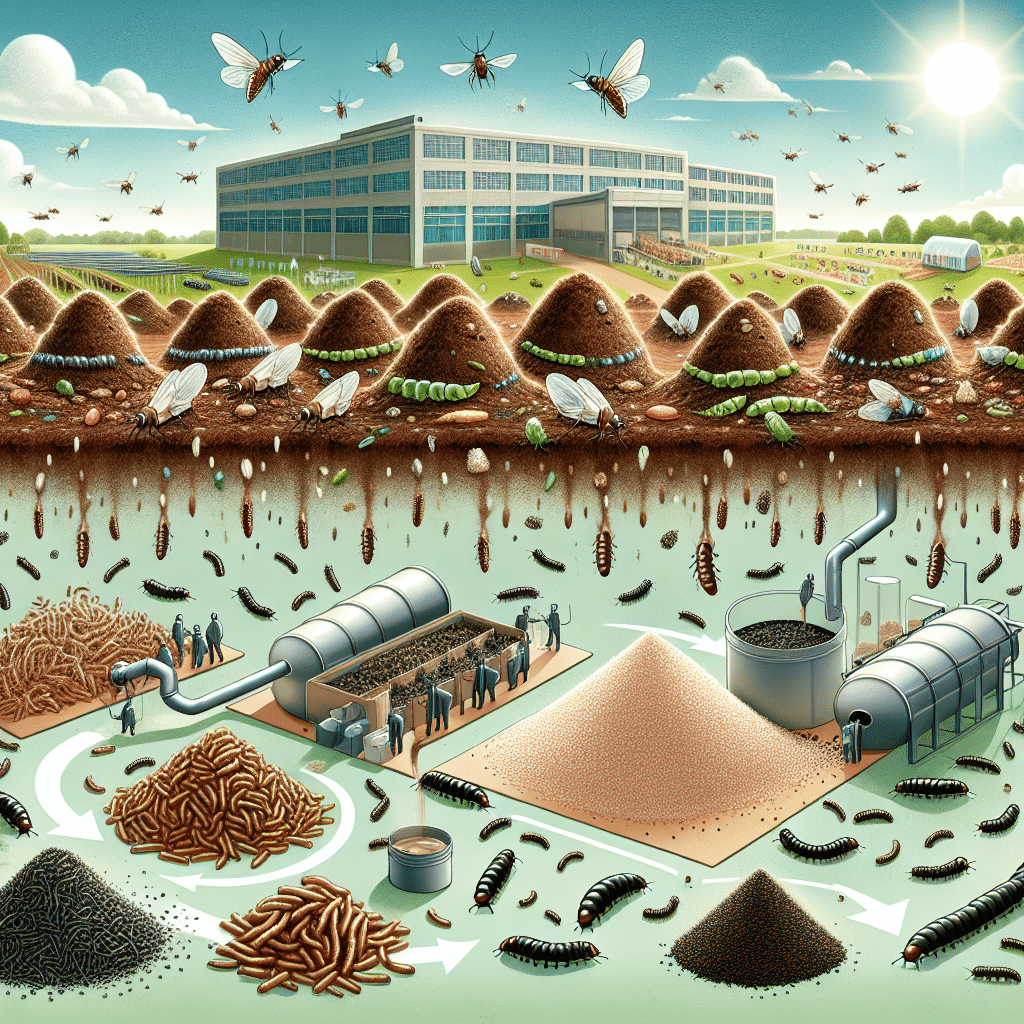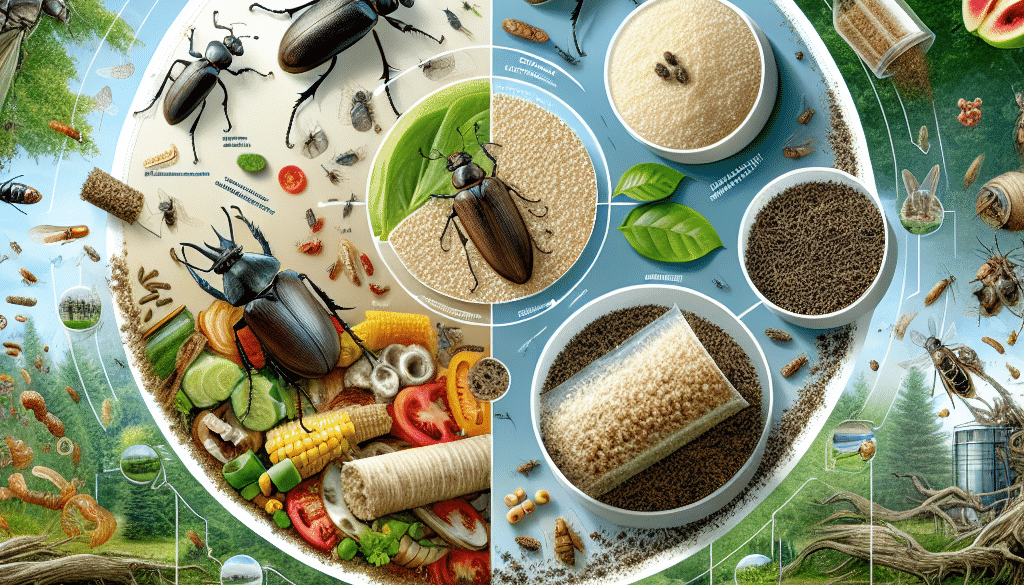Sustainable Ingredients: Insects Converting Waste into Protein
-
Table of Contents
- Insects as Sustainable Protein: Transforming Waste into Nutritional Gold
- The Rise of Entomophagy and Insect Farming
- Converting Waste into Protein: How Insects Make It Possible
- Case Studies: Success Stories in Insect Farming
- Environmental and Nutritional Benefits of Insect Protein
- Challenges and Considerations
- Conclusion: Embracing Insects for a Sustainable Future
- Discover ETprotein’s Sustainable Protein Products
Insects as Sustainable Protein: Transforming Waste into Nutritional Gold

The quest for sustainable food sources is more pressing than ever as the global population continues to grow and the environmental impact of traditional agriculture becomes increasingly evident. One innovative solution that has been gaining traction is the use of insects to convert organic waste into high-quality protein. This approach not only addresses the issue of food waste but also provides an eco-friendly alternative to conventional animal protein sources.
The Rise of Entomophagy and Insect Farming
Entomophagy, the practice of eating insects, is not new. Many cultures around the world have been consuming insects for centuries due to their nutritional benefits and availability. However, the industrial-scale farming of insects for human consumption and animal feed is a relatively recent development. Insect farming offers a sustainable way to produce protein, as insects require significantly less land, water, and feed compared to traditional livestock.
Converting Waste into Protein: How Insects Make It Possible
Insects have the remarkable ability to feed on a variety of organic waste materials, including food scraps, agricultural by-products, and even manure. Through their natural biological processes, they can convert these waste products into high-quality protein and other valuable nutrients.
- Black Soldier Fly Larvae (BSFL): These larvae are voracious eaters and can consume large amounts of organic waste. As they grow, they accumulate protein and fat, making them an excellent source of nutrients for animal feed and even human consumption.
- Mealworms: Another insect commonly farmed for protein is the mealworm. They can thrive on a diet of grains and vegetables and are known for their high protein content.
- Crickets: Crickets are also popular for insect farming. They can be fed a variety of plant-based materials and are efficient at converting feed into protein.
These insects not only help in reducing waste but also produce fewer greenhouse gases and ammonia than conventional livestock, making them a more environmentally friendly option.
Case Studies: Success Stories in Insect Farming
Several companies and initiatives around the world have successfully implemented insect farming to manage waste and produce protein. Here are a few examples:
- AgriProtein: This company has pioneered the use of BSFL to recycle food waste into sustainable animal feed. They have multiple facilities around the world that process tons of organic waste each day.
- Entomo Farms: Based in Canada, Entomo Farms raises crickets for human consumption. Their products include whole roasted crickets and cricket powder, which can be used in a variety of recipes.
- Ynsect: A French company that focuses on mealworm production for fish and pet food, as well as for plant fertilizers. They have developed automated facilities to optimize the production process.
These companies not only contribute to waste reduction but also create jobs and promote sustainable practices in the food industry.
Environmental and Nutritional Benefits of Insect Protein
Insect protein is not only sustainable but also highly nutritious. Insects are rich in protein, essential amino acids, vitamins, and minerals. They can serve as a complete protein source, especially for populations that have limited access to traditional animal proteins.
The environmental benefits of insect farming are significant. Compared to cattle, pigs, and chickens, insects emit fewer greenhouse gases, use less water, and require less feed to produce the same amount of protein. This makes insect farming a promising solution to reduce the environmental footprint of our food systems.
Challenges and Considerations
Despite the clear benefits, there are challenges to the widespread adoption of insect protein. These include:
- Regulatory hurdles, as food safety standards for insect farming are still being developed in many regions.
- Consumer acceptance, since the idea of eating insects is still met with apprehension in many cultures.
- Scaling up production to meet global demand while maintaining sustainable practices.
Addressing these challenges requires education, research, and collaboration between industry stakeholders, policymakers, and consumers.
Conclusion: Embracing Insects for a Sustainable Future
Insects offer a viable solution to some of the most pressing issues in food sustainability. By converting waste into protein, they help close the loop in our food systems, reduce environmental impact, and provide a nutritious food source. As technology advances and societal attitudes shift, insects are poised to play a significant role in our future diets and in the global effort to achieve food security and sustainability.
Discover ETprotein’s Sustainable Protein Products
If you’re interested in exploring sustainable protein options, ETprotein offers a range of high-quality products that cater to various industries. Their offerings include organic plant-based proteins and L-(+)-Ergothioneine (EGT), which are produced with a commitment to sustainability and quality. Whether you’re in the food and beverage industry, sports nutrition, or health and wellness, ETprotein has solutions that align with eco-friendly practices and meet your protein needs.
About ETprotein:
ETprotein, a reputable protein and L-(+)-Ergothioneine (EGT) Chinese factory manufacturer and supplier, is renowned for producing, stocking, exporting, and delivering the highest quality organic bulk vegan proteins and L-(+)-Ergothioneine. They include Organic rice protein, clear rice protein, pea protein, clear pea protein, watermelon seed protein, pumpkin seed protein, sunflower seed protein, mung bean protein, peanut protein, and L-(+)-Ergothioneine EGT Pharmaceutical grade, L-(+)-Ergothioneine EGT food grade, L-(+)-Ergothioneine EGT cosmetic grade, L-(+)-Ergothioneine EGT reference grade and L-(+)-Ergothioneine EGT standard. Their offerings, characterized by a neutral taste, non-GMO, allergen-free attributes, with L-(+)-Ergothioneine purity over 98%, 99%, cater to a diverse range of industries. They serve nutraceutical, pharmaceutical, cosmeceutical, veterinary, as well as food and beverage finished product distributors, traders, and manufacturers across Europe, USA, Canada, Australia, Thailand, Japan, Korea, Brazil, and Chile, among others.
ETprotein specialization includes exporting and delivering tailor-made protein powder and finished nutritional supplements. Their extensive product range covers sectors like Food and Beverage, Sports Nutrition, Weight Management, Dietary Supplements, Health and Wellness Products, and Infant Formula, ensuring comprehensive solutions to meet all your protein needs.
As a trusted company by leading global food and beverage brands and Fortune 500 companies, ETprotein reinforces China’s reputation in the global arena. For more information or to sample their products, please contact them and email sales(at)ETprotein.com today.














